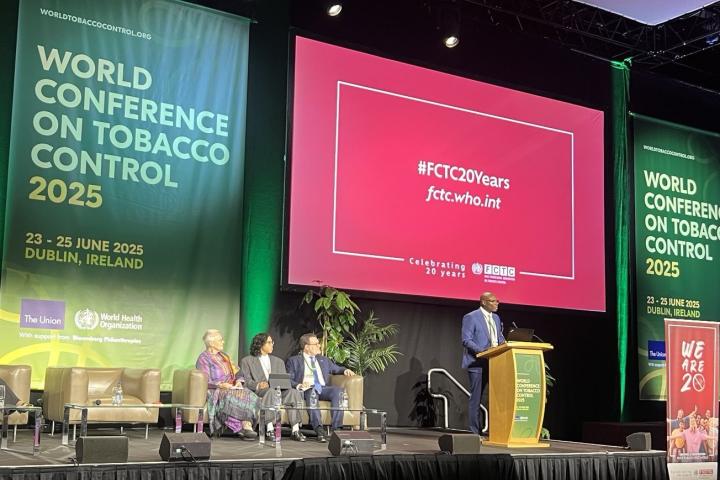REEP members attend the 2025 World Conference on Tobacco Control

The 2025 World Conference on Tobacco Control (WCTC), held in Dublin from 23–25 June 2025, was the first since 2018 and provided a timely opportunity for the global tobacco control community to reconnect and discuss key issues related to research and advocacy in person.
Despite visa issues that prevented three REEP colleagues from attending—an issue that affected many participants from the Global South—REEP was represented by Corné van Walbeek, Sam Filby, Nicole Vellios, and Qing Li.
Corné attended a pre-conference summit on tobacco endgame strategies, which brought together global leaders to discuss strategies aimed at eliminating tobacco sales. The summit revealed both enthusiasm and some division around the definition of the endgame—particularly whether it should target tobacco alone or include nicotine. In countries with low smoking prevalence, where the endgame is realistic possibility, participants indicated that strategic communication is crucial. For example, they suggested focusing the discussion on industry accountability, avoiding polarising terms like “radical,” and presenting the endgame as a logical next step to existing tobacco control interventions.
The conference’s tax sessions were particularly relevant to REEP. Ministers of Finance from Chile and Senegal shared political economy strategies for building support for excise tax increases, emphasising coalition-building, simplicity in communication, and the fiscal appeal of health taxes. These insights reaffirmed the importance of REEP’s work, but also suggested the need to expand partnerships beyond the research space.
REEP made several presentations – both oral and poster – at the conference.
- Sam Filby presented: A global study of the association between cigarette excise tax structure and the dispersion of cigarette prices.
- Sam also presented a paper co-authored with Estelle Dauchy (and Ce Shang): Identifying effective tax policies to reduce cigarette smoking: Cross-country empirical evidence.
- Nicole Vellios presented the results from a newly published paper co-authored with Corné (and Emmanuel Guindon): The effect of cigarette prices on smoking cessation in South Africa using duration analysis: 1970–2017.
- Corné van Walbeek presented: Earmarking health tax revenue for public health in Jamaica: An example for other countries, and (co-authored with Tim Evans): Tobacco is not just bad for your health; tobacco shares are poor financial investments.
- Qing Li presented two papers co-authored with Corné (and others): Tobacco farming related health shocks and labor use among smallholder farmers in Kenya; and Contract, credit, and tobacco farming efficiency among smallholder tobacco farmers in Kenya and Indonesia.
Additional papers included:
- Household tobacco expenditure and its impact on child nutrition: evidence from South Africa: by Zunda Chisha, co-authored with Corné (and Grieve Chelwa).
- Barriers and opportunities in Zambia’s health tax policy on tobacco, alcohol, and SSBs: by Zunda and co-authored with Leoné Walters (with Chitalu Miriam Chama-Chiliba and Felix Masiye).
- Revenue lost in Zambia as a result of excise tax incentive for local cigarette manufacturers: by Zunda, and co-authored with Vanessa Darsamo, Nicole and Corné.
- Illicit trade in South Africa: new evidence from nationally representative surveys: by Mxolisi Zondi, co-authored with Kirsten Van der Zee and Corné.
- Interactions between ENDS and cigarette consumption: evidence from a 2022 national telephone survey in South Africa, by Kirsten and co-authored with Corné.
- Brand switching during South Africa's COVID-19 tobacco sales ban and its long-term effect on illicit trade, by Kirsten.
For the full programme, go to https://wctc2025.abstractserver.com/program/#/persons.
In all, the WCTC 2025 underscored the need for tobacco control efforts that are not only evidence-based but also collaborative, politically attuned, and strategically communicated. REEP is committed to contributing to these ongoing efforts by generating evidence, informing policy, and supporting effective tobacco control strategies across diverse contexts.
